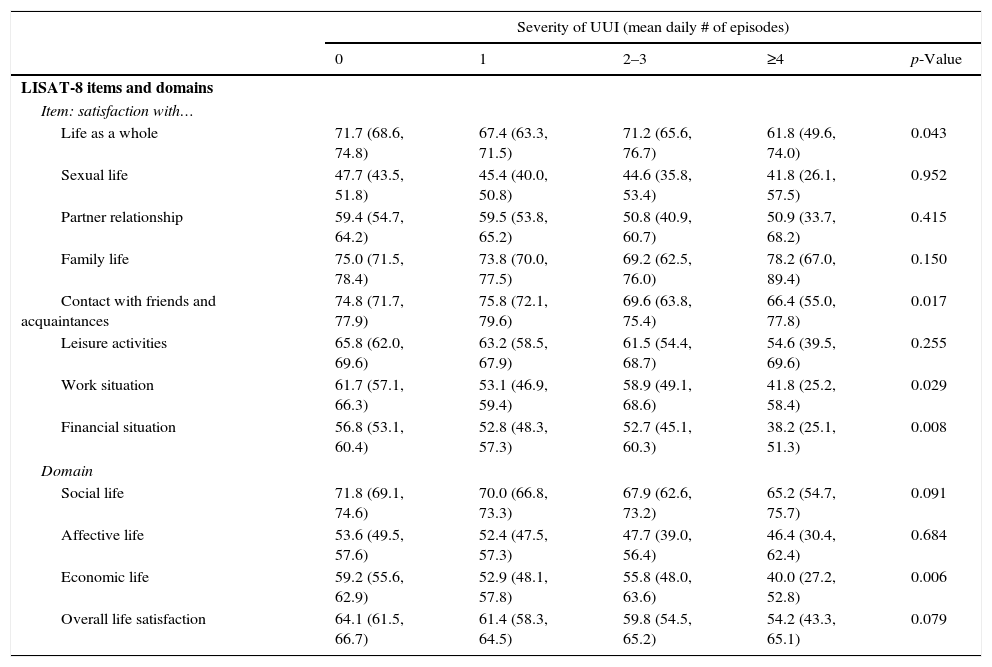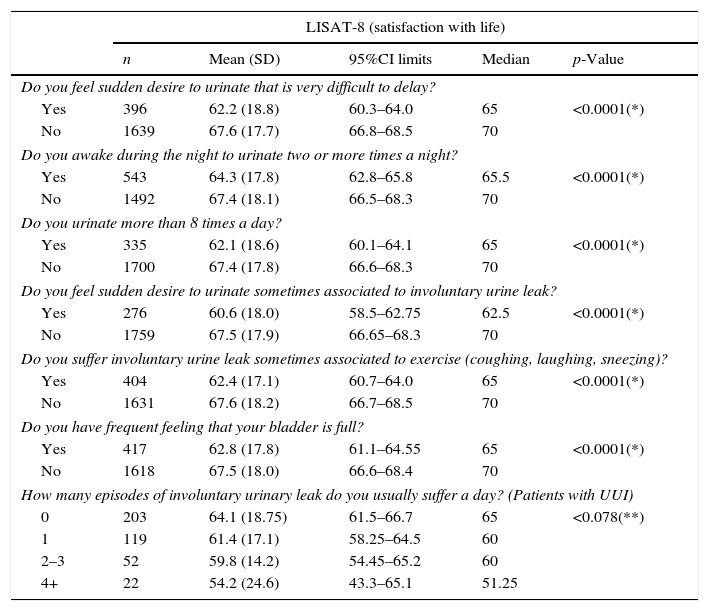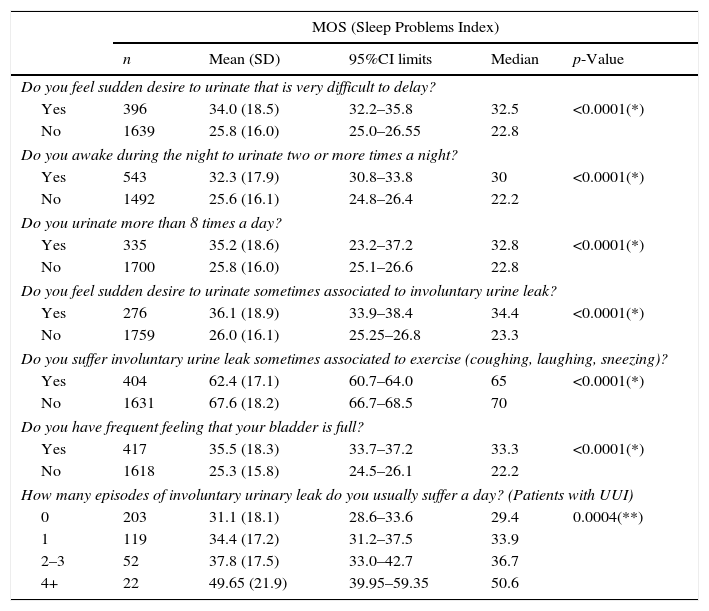To explore the impact of urgency urinary incontinence (UUI) on well-being in non-institutionalized patients with overactive bladder (OAB) in a community sample.
MethodsA cross-sectional web-based study was conducted in the general population, including males and females, >18 years of age. Patients with probable OAB were identified using a validated algorithm together with a score ≥8 on the OAB-V8 scale. Presence of coping behavior was considered determinant for the clinical diagnosis of OAB. Individual well-being was determined through a battery of patient-reported outcomes (PRO) measurements including assessment of health-related quality of life (EQ-5D), sleep disturbances (MOS Sleep), and life satisfaction (LISAT-8). Patients were grouped according to the number of daily UUI episodes (UUI severity): 0 (dry OAB), 1, 2–3, or ≥4. Multivariate analysis to evaluate factors independently affecting quality of life was undertaken.
ResultsA total of 396 patients (52.5% women, mean age: 55.3 [11.1] years, OAB-V8 mean score: 14.5 [7.9]) out of 2035 subjects participating from the general population met the criteria for OAB: 203 (51.3%) with 0 episodes, 119 (30.1%) with 1, 52 (13.1%) with 2 or 3, and 22 (5.6%) with ≥4 episodes. A statistically significant linear adjusted association was found between number of UUI episodes and PRO scores. Participants with more episodes had poorer health profiles and self-evaluated quality of life, worse life satisfaction, and more sleep disturbances and fewer hours of sleep per night. Number of incontinence episodes was independent factor to affect quality of life using both LISAT-8 and MOS questionnaires.
ConclusionSeverity of UUI was significantly associated with poorer individual well-being in subjects with OAB in a community sample in Spain.
Explorar el impacto de la incontinencia urinaria de urgencia (IUU) en el bienestar de los pacientes no institucionalizados con vejiga hiperactiva (VH) en una muestra de la comunidad.
MétodosSe llevó a cabo un estudio transversal basado en Internet en la población general, incluyendo hombres y mujeres, >18 años de edad. Los pacientes con probable VH se identificaron utilizando un algoritmo validado junto con una puntuación ≥8 en la escala OAB-V8. La presencia de comportamiento de adaptación se consideró determinante para el diagnóstico clínico de la VH. Se determinó bienestar individual a través de una batería de mediciones de resultados comunicados por el paciente (PRO) incluida la evaluación de la calidad de vida relacionada con la salud (EQ-5D), alteraciones del sueño (sueño MOS) y satisfacción con la vida (LISAT-8). Los pacientes fueron agrupados de acuerdo con el número de episodios diarios de IUU (gravedad IUU): 0 (VH seca), 1, 2-3 o ≥4. Se realizó un análisis multivariado para evaluar los factores que afectan de forma independiente la calidad de vida.
ResultadosUn total de 396 pacientes (52,5% mujeres, media de edad: 55,3 [11,1] años, OAB-V8 puntuación media: 14,5 [7,9]) de 2.035 sujetos participantes de la población general cumplieron los criterios de VH: 203 (51,3%) con 0 episodios; 119 (30,1%) con 1; 52 (13,1%) con 2 o 3 y 22 (5,6%) con >4 episodios. Se encontró una asociación ajustada lineal estadísticamente significativa entre el número de episodios de IUU y las puntuaciones de PRO. Los participantes con más episodios tenían peores perfiles de salud y calidad de autoevaluación de la vida, peor satisfacción con la vida, más trastornos del sueño y menos horas de sueño por noche. El número de episodios de incontinencia fue factor independiente para afectar a la calidad de vida utilizando los cuestionarios LISAT-8 y MOS.
ConclusiónLa gravedad de la IUU se asoció significativamente con peor bienestar individual en los sujetos con VH en una muestra comunitaria en España.













